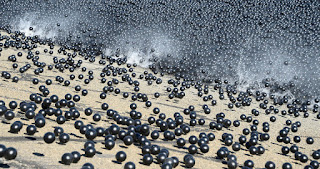Like all mid-life crisis
infatuations my love for John Bridgeman crept up on me almost unnoticed.
I have known him for many years,
we used to be work colleagues. He is now Professor for Environmental
Engineering at the University of Birmingham, one of the more distinguished UK
universities. John has somewhat quirky sense of humour (I think it is caused by
his constant close proximity to sewage). Earlier this summer I emailed John and
received his out-of-office message. Unlike most such messages, John’s was a
glorious blend of wit and humour.
Below is his Christmas
out-of-office message. Read and enjoy (and then, just to fill his inbox, send
him an email expressing your appreciation to j.bridgeman@bham.ac.uk)
OUT OF
OFFICE MESSAGE FOR JOHN BRIDGEMAN
Thank you for your
email, the contents of which I am sure are informative, instructive and
interesting in equal measure. Sadly, I am unable to engage with you and
your missive directly at this time as, in the words of the world’s most famous
septuagenarian amateur tennis player and chanteur it is “Christmas time,
mistletoe and wine, children singing Christian rhyme, etc. etc.” and
consequently I find myself in the bosom of my family wearing a jauntily
misplaced paper hat and smelling faintly of festive sherry and sprouts.
However, even
though it is Christmas, I feel it my duty to provide an appropriate response to
your email. Thus, please indulge me for a few moments. I would be
grateful if you would imagine that you have called one of those infamous
telephone help lines (choose a poorly performing utility of your choice) and
that you have been on hold for the last 45 minutes with only a muzak-mangled
version of Greg Lake’s ‘I believe in Father Christmas’ for company.
Suddenly you find you are greeted by an electronic voice asking you to select
the most appropriate option. With that in mind, here we go:
1. If
you are a journal editor:
Thank you for your rejection of my latest manuscript. I shall, of course take note of the reviewers’ insightful comments and, in particular, take particular care and attention to cite the entire canon of Reviewer 3’s work in all my future contributions, despite the fact it has nothing to do with the subject matter of my manuscript. All power to his h-index I say.
Thank you for your rejection of my latest manuscript. I shall, of course take note of the reviewers’ insightful comments and, in particular, take particular care and attention to cite the entire canon of Reviewer 3’s work in all my future contributions, despite the fact it has nothing to do with the subject matter of my manuscript. All power to his h-index I say.
2.
If you are a Research Council employee:
Thank you for your rejection of my latest grant application. I agree that it is entirely appropriate for you to take four months to reject a proposal that has been lovingly crafted over the previous six months on the basis of some particularly vitriolic comments from Reviewer F76RSD. A cynic might think that these comments were borne more from a desire to ensure that a competitor from an equally mid-ranking Russell Group university does not steal a march on one’s own research portfolio rather than a detailed analysis of the proposal’s scientific merits. Fortunately, I am free of such cynicism and am overjoyed that an esteemed anonymous colleague has taken the time to describe my ideas as “naïve”, “intuitively obvious” and (my personal favourite) the description of me as “academically lacking and intellectually weak”.
Thank you for your rejection of my latest grant application. I agree that it is entirely appropriate for you to take four months to reject a proposal that has been lovingly crafted over the previous six months on the basis of some particularly vitriolic comments from Reviewer F76RSD. A cynic might think that these comments were borne more from a desire to ensure that a competitor from an equally mid-ranking Russell Group university does not steal a march on one’s own research portfolio rather than a detailed analysis of the proposal’s scientific merits. Fortunately, I am free of such cynicism and am overjoyed that an esteemed anonymous colleague has taken the time to describe my ideas as “naïve”, “intuitively obvious” and (my personal favourite) the description of me as “academically lacking and intellectually weak”.
3.
If you are a conference organizer:
Thank you for your email inviting me to chair a session at your forthcoming conference on macramé and wig manufacture in 17th century Prussia. Whilst not an ideal alignment with my own research interests, I would of course be only too pleased to make my own flight and accommodation arrangements to join you in China / Malaysia / Uzbekistan (delete as appropriate) at my own expense in July 2016. I look forward to hearing a succession of dull and ill-founded presentations after which I will attempt to encourage the audience of bored PhD students to generate some form of contribution which will no doubt result in at least one particularly arrogant yet bizarrely esteemed Professor to make a monologue on how useful his own research is and how it is significantly more important than anything else spoken in the previous 90 minutes.
Thank you for your email inviting me to chair a session at your forthcoming conference on macramé and wig manufacture in 17th century Prussia. Whilst not an ideal alignment with my own research interests, I would of course be only too pleased to make my own flight and accommodation arrangements to join you in China / Malaysia / Uzbekistan (delete as appropriate) at my own expense in July 2016. I look forward to hearing a succession of dull and ill-founded presentations after which I will attempt to encourage the audience of bored PhD students to generate some form of contribution which will no doubt result in at least one particularly arrogant yet bizarrely esteemed Professor to make a monologue on how useful his own research is and how it is significantly more important than anything else spoken in the previous 90 minutes.
4.
If you are a prospective overseas PhD student seeking to read for a PhD in my
research group:
Thank you for your email; we are always keen to hear from high quality students looking for work that aligns with our research interests. However, we do operate particularly stringent entry requirements and to be considered you must reach the following standards: (1) Can you write your own name? (2) Do you have cash? If the answer to both questions is ‘yes’, please pack your bags and I will be delighted to welcome you to the Department in the New Year. (Incidentally, if you can only answer ‘yes’ to Q2, we’ll take you anyway).
Thank you for your email; we are always keen to hear from high quality students looking for work that aligns with our research interests. However, we do operate particularly stringent entry requirements and to be considered you must reach the following standards: (1) Can you write your own name? (2) Do you have cash? If the answer to both questions is ‘yes’, please pack your bags and I will be delighted to welcome you to the Department in the New Year. (Incidentally, if you can only answer ‘yes’ to Q2, we’ll take you anyway).
5.
If you are a recruitment consultant:
Thank you for your email. It is a pleasure to hear the sound of a barrel being scraped once more. I would be only too pleased to make my way to London at your convenience to be subjected to a critical analysis of my failings as an academic after which you can inform me that your ‘client’ does not feel that, on this occasion, my skillset is appropriately aligned to the needs of this most demanding of roles.
Thank you for your email. It is a pleasure to hear the sound of a barrel being scraped once more. I would be only too pleased to make my way to London at your convenience to be subjected to a critical analysis of my failings as an academic after which you can inform me that your ‘client’ does not feel that, on this occasion, my skillset is appropriately aligned to the needs of this most demanding of roles.
6.
If you are a Pro Vice Chancellor:
Thank you for your email. It would be my pleasure to jump. Exactly how high would that be sir / ma’am?
Thank you for your email. It would be my pleasure to jump. Exactly how high would that be sir / ma’am?
7.
If you are an Undergraduate student who wants to complain about your coursework
or exam mark:
Look, just fxxk off will you.
Look, just fxxk off will you.




